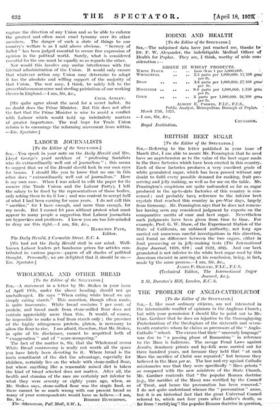BRITISH BEET SUGAR
[To the Editor of the SPECTATOR.] Sin,—Referring to the letter published . in your issue of March 21st, I am able to assure Mr. Pennington that he need have no apprehension as to the value of the beet sugar made in the three factories -which have been erected in this country. Each of these factories produces a very excellent grade of white granulated sugar, which has been proved without any doubt to fulfil every possible demand for cooking, fruit preserving and jelly making, as well as for use on the table. Mr. Pennington's suspicions are quite unfounded so far as. sugar produced in the up-to-date factories of this country is concerned; and probably have reference to the inferior beet crystals that reached this country in. pre-War days, largely from Germany. Mr. Pennington says that he does not remember having seen any considered judgment by experts on the comparative merits of cane and beet sugar. Nevertheless such judgments have been given from time to time. For example, Prof. G. W. Shaw, of the Experiment Station of the State of California, an unbiased authority, not long ago carried out numerous careful investigations in this direction, and found no difference between the two sugars, either in fruit preserving or in jelly-making tests (The Inkrnational Sugar Journal, 1919, 619; and 1922, 402). And our beet granulated is not inferior to the white beet sugar used by this American chemist in arriving at his conclusion, being, in fact, made by the same process.—! am, Sir, &c., JAMES P. OGILVIEp F.I.C., F.C.S. (Technical Editor, The International Sugar Journal, &c.).
2 St. Dunstan's Hill, London, E.C. 3.










































 Previous page
Previous page